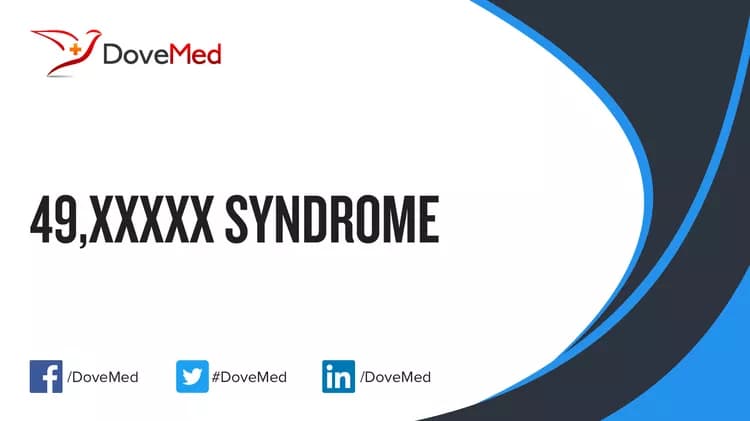What are the other Names for this Condition? (Also known as/Synonyms)
- 49,XXXXX Chromosome Constitution
- Chromosome XXXXX Syndrome
- Pentasomy X Syndrome
What is 49,XXXXX Syndrome? (Definition/Background Information)
- 49,XXXXX Syndrome is an extremely rare chromosomal disorder affecting females, with only about 20 cases reported in the scientific literature so far
- Females with 49,XXXXX Syndrome have 3 extra X chromosomes in their cells apart from the normal 2 X chromosomes in normal females. The extra X chromosomes bring the number of X chromosomes to 5, and the total number of chromosomes to 49
- The disorder may be caused by non-separation of chromosome in the reproductive cells (eggs and sperms) of the parents. The extra X chromosomes generally originate from the mother
- Affected individuals exhibit symptoms of facial abnormalities, along with malformations and malfunction of the heart, kidneys, musculoskeletal system and reproductive organ
Who gets 49,XXXXX Syndrome? (Age and Sex Distribution)
- 49,XXXXX Syndrome is a very rare congenital disorder; only 20 known cases have been reported worldwide
- The disorder affects females in whom the symptoms may occur at birth
- Worldwide, individuals of all racial and ethnic groups may be affected
What are the Risk Factors for 49,XXXXX Syndrome? (Predisposing Factors)
- Advanced maternal age at conception is considered a risk factor for giving birth to a child with 49,XXXXX Syndrome
It is important to note that having a risk factor does not mean that one will get the condition. A risk factor increases one’s chances of getting a condition compared to an individual without the risk factors. Some risk factors are more important than others.
Also, not having a risk factor does not mean that an individual will not get the condition. It is always important to discuss the effect of risk factors with your healthcare provider.
What are the Causes of 49,XXXXX Syndrome? (Etiology)
- 49,XXXXX Syndrome may be caused by non-separation of chromosome in the reproductive cells (eggs and sperms) of the parents
- The extra X chromosomes generally originate from the mother
What are the Signs and Symptoms of 49,XXXXX Syndrome?
The signs and symptoms of 49,XXXXX Syndrome may include:
Very frequently present symptoms in 80-99% of the cases:
- Low-set, posteriorly rotated ears
- Muscular hypotonia
- Camptodactyly of finger
Frequently present symptoms in 30-79% of the cases:
Occasionally present symptoms in 5-29% of the cases:
- Abnormality of immune system physiology
- Abnormality of the cardiac septa
- Delayed puberty
- Hip dysplasia
- Patent ductus arteriosus
(Source: 49,XXXXX Syndrome; Genetic and Rare Diseases Information Center (GARD) of National Center for Advancing Translational Sciences (NCATS), USA.)
How is 49,XXXXX Syndrome Diagnosed?
49,XXXXX Syndrome is diagnosed on the basis of the following information:
- Complete physical examination
- Thorough medical history evaluation
- Assessment of signs and symptoms
- Laboratory tests
- Imaging studies
- Biopsy studies, if necessary
- Molecular genetic testing and karyotyping
Many clinical conditions may have similar signs and symptoms. Your healthcare provider may perform additional tests to rule out other clinical conditions to arrive at a definitive diagnosis.
What are the possible Complications of 49,XXXXX Syndrome?
The complications of 49,XXXXX Syndrome may include:
- Problems with normal movement owing to musculoskeletal disorders
- Malfunction of kidneys due to structural abnormalities
- Malfucntion of heart, leading to the following:
- Pulmonary hypertension (high blood pressure in the lungs)
- Heart failure
- Endocarditis: Bacterial infection of the heart valves or inner linings of the hear
- Arrhythmia or irregular heartbeat
- Intellectual deficiency, which may result in an inability to lead an independent life
Complications may occur with or without treatment, and in some cases, due to treatment also.
How is 49,XXXXX Syndrome Treated?
There is no cure for 49,XXXXX Syndrome, since it is a genetic condition. The treatment is usually given to manage the signs and symptoms and any complication that develops, and may include:
- Surgery to correct abnormalities in the bones
- Surgical correction of heart abnormalities
- Physical therapy to improve muscle tone and movement
- Special education
How can 49,XXXXX Syndrome be Prevented?
Currently, 49,XXXXX Syndrome may not be preventable, since it is a genetic disorder.
- Genetic testing of the expecting parents (and related family members) and prenatal diagnosis (molecular testing of the fetus during pregnancy) may help in understanding the risks better during pregnancy
- If there is a family history of the condition, then genetic counseling will help assess risks, before planning for a child
- Active research is currently being performed to explore the possibilities for treatment and prevention of inherited and acquired genetic disorders
Regular medical screening at periodic intervals with tests and physical examinations are recommended.
What is the Prognosis of 49,XXXXX Syndrome? (Outcomes/Resolutions)
- The prognosis of 49,XXXXX Syndrome is dependent upon the severity of the signs and symptoms and associated complications, if any
- Individuals with mild conditions have better prognosis than those with severe symptoms and complications
- Typically, the prognosis may be assessed on a case-by-case basis
Additional and Relevant Useful Information for 49,XXXXX Syndrome:
49,XXXXX Syndrome is also known by the following names:
- 49,XXXXX Karyotype
- Chromosome X Pentasomy
- Pentasomy X
- Penta-X Syndrome
- Quintuple X Syndrome
The following DoveMed website links are useful resources for additional information:
http://www.dovemed.com/diseases-conditions/rare-disorders/
http://www.dovemed.com/diseases-conditions/patent-ductus-arteriosus-pda/
Related Articles
Test Your Knowledge
Asked by users
Related Centers
Related Specialties
Related Physicians
Related Procedures
Related Resources
Join DoveHubs
and connect with fellow professionals


0 Comments
Please log in to post a comment.